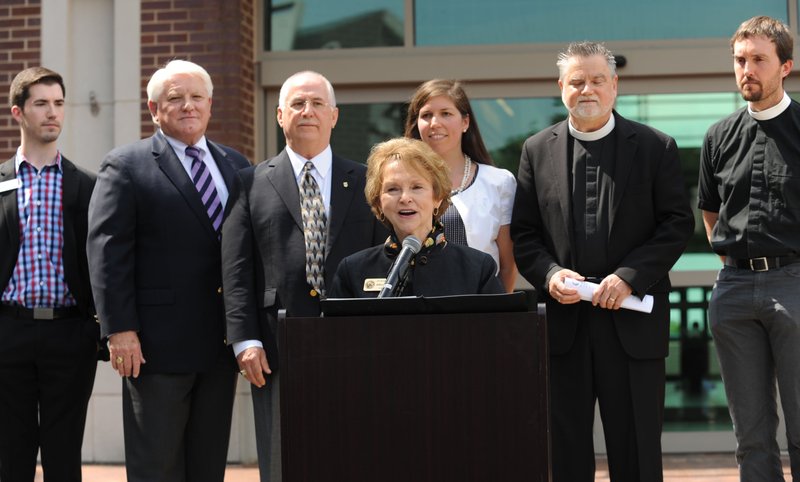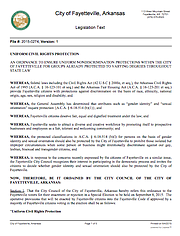FAYETTEVILLE -- A group of local lawyers and residents worked quietly for months to craft a proposed nondiscrimination ordinance for the city, one of the proposal's sponsors said Friday.
Alderwoman Adella Gray, at a news conference on the steps of the Fayetteville Town Center, told a crowd of about three dozen people she's been thinking about how best to implement a policy protecting gay, lesbian, bisexual and transgender residents ever since voters repealed a controversial Civil Rights Administration ordinance late last year.
Fayetteville Civil Rights Commission
Under a proposal by aldermen Adella Gray and Matthew Petty, a seven-member Civil Rights Commission would investigate complaints of discrimination based on sexual orientation and gender identity if the complaints could not be resolved through private mediation.
According to the proposal, the commission would be comprise:
• Two representatives of the business community;
• Two owners or managers of rental property;
• One representative with experience in human resources or employment law; and
• Two citizens at large, a least one of whom identifies as gay, lesbian, bisexual or transgender.
Members would be appointed by the City Council to three-year terms.
Source: Staff Report
Gray said the proposal, up for its first reading June 16, came after "many, many meetings and months of drafts" with Danielle Weatherby, an assistant law professor at the University of Arkansas; Mark Martin, a Fayetteville lawyer specializing in union labor law and workers' compensation issues; and representatives for the NWA Center for Equality, a local advocate for LGBT rights.
Gray said several other lawyers, including Eva Madison, a Washington County justice of the peace who specializes in employment law, reviewed the ordinance once it was drafted as did Steve Clark, president and CEO of the Fayetteville Chamber of Commerce.
After the proposal was presented to City Attorney Kit Williams, he, Weatherby, Martin, and first Petty, then Gray, modified it as a group.
"We held our meetings separately ... to not violate the (Freedom of Information) Act," Petty, co-sponsor of the ordinance, said Friday. The state's open records law requires entities such as the City Council to notify the public when multiple members meet to discuss city business.
Gray said the new proposal, called the Uniform Civil Rights Protection ordinance, is an attempt to address issues that came up during debate over the Civil Rights Administration ordinance. The ordinance was overturned Dec. 9 with 52 percent of the 14,580 residents who cast ballots in the special election voting to repeal the measure.
"I want everyone to know that we have taken into consideration all of the concerns we heard at the last campaign," Gray said Friday. "We have tried very, very hard to respond to every one of those concerns, all the while keeping in mind that our No. 1 focus is all citizens of Fayetteville have the right to live and work free of discrimination."
Alderman John La Tour, who was involved with the effort to repeal the Civil Rights Administration ordinance, said Friday he wasn't satisfied with the new proposal.
"I think it's politically arrogant for them to bring back this ordinance after we repealed it," La Tour said. "The people spoke, and they're just ignoring the people.
"This should be at the state level at best, and the City Council really shouldn't take part in this debate," he added. "We should limit discussion to those things that we all agree on or disagree on rather than taking up an issue like this that splits our city right down the middle."
Clark, the chamber president, noted several differences between the latest nondiscrimination proposal and the previous ordinance following Friday's press conference.
It removed terms, such as socioeconomic background and "real or perceived" sexual orientation the chamber's board objected to. A single civil rights administrator would no longer review complaints of discrimination. Instead, complainants and respondents would appear before a City Council-appointed Civil Rights Commission should private mediation fail to resolve a complaint.
Clark also said he was more comfortable with several terms in the new proposal, such as the definition of "employer," that were taken explicitly from existing state laws, including the Arkansas Civil Rights Act of 1993 and the Arkansas Fair Housing Act.
"You just keep going down the list of things we objected to, and they were taken out," he said.
The chambern was a significant opponent of the Civil Rights Administration ordinance when it was being debated last year.
"We said we don't believe in discrimination," Clark said. "But we also do not support badly written ordinances -- ordinances which have a negative impact on businesses in our community. This is a well-written ordinance."
He said the chamber's board hasn't taken an official stance on Gray's and Petty's proposal. But, he added, "When this started coming about, we started making sure our board members knew about it."
The City Council on Aug. 20 voted 6-2 in favor of the Civil Rights Administration ordinance after nearly 10 hours of public debate. The issue was only put to a public vote after members of a group called Repeal 119 submitted more than 4,200 signatures calling for a special election.
Aldermen Gray, Petty, Sarah Marsh, Mark Kinion, Alan Long and Rhonda Adams voted for the ordinance. Justin Tennant and Martin Schoppmeyer opposed it. La Tour has since replaced Adams.
Unlike the previous ordinance, Gray's and Petty's proposal includes a provision directly referring the issue to a public vote. A special election would be scheduled Sept. 8 if it's approved by a simple majority of the council.
City Clerk Sondra Smith didn't have a firm estimate Friday for how much the special election would cost. She said the Dec. 9 referendum cost nearly $37,000.
Like the previous ordinance, the Gray-Petty proposal would prohibit private employers, landlords and businesses from firing, refusing to hire, evicting, refusing to rent to or declining service to someone because of his sexual orientation and or their gender identity.
All Fayetteville residents would be free to file complaints with the city attorney's office if they felt they had been discriminated against. The city would then have four days under the ordinance to arrange for informal and confidential mediation between the alleged discriminator and the complainant.
Gray, Petty and Williams all said Friday that Mayor Lioneld Jordan would have the authority to name the mediator but hasn't yet done so. Williams said he thought the city's human resources director would be the most appropriate person to try to mediate complaints.
If mediation was unsuccessful in resolving a complaint, the Civil Rights Commission would have between five and 14 days to hold a public hearing where evidence would be reviewed, witnesses could be called and testimony would be heard.
If, after the hearing, commissioners determined a respondent had violated the Uniform Civil Rights Protection ordinance, the commission would forward the case to the city prosecutor's office.
If the prosecutor decided to file charges, violators would be subject to fines of up to $100 for their first offense. Subsequent offenses could result in fines of up to $500.
NW News on 06/06/2015

